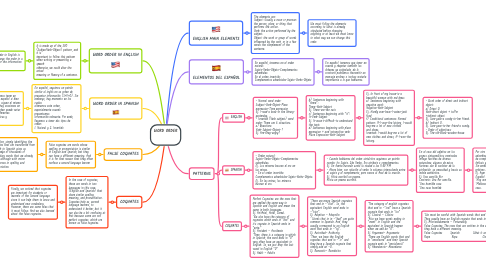
1. WORD ORDER IN ENGLISH
1.1. It is made up of the SVO (SubjectVerb-Object) pattern, and it is important to follow this pattern when writing or presenting a speech otherwise, we could alter the actual meaning or fluency of a sentence.
1.1.1. To sum up the Word order in English is important. Once we change the order in a sentence the meaning or the information can change.
2. WORD ORDER IN SPANISH
2.1. En español, seguimos un patrón similar al inglés en su orden de presentar información (S+V+O). Sin embargo, hay momento en los cuales alteramos este orden, especialmente cuando presentamos información relevante. Por ende, llegamos a tener dos tipos de orden: 1. Natural y 2. Invertido
2.1.1. En español, debemos tener en cuenta que en el español si bien hay patrones que siguen el mismo orden del inglés hay ocasiones en las cuales este orden puede variar dependiendo a diferentes variantes lingüísticas y gramaticales.
3. FALSE COGNATES
3.1. False cognates are words whose spelling or pronunciation is similar in English and Spanish, but they can have a different meaning. And it is for that reason that they often confuse a second language learner
3.1.1. Therefore, simply identifying the cognates that are transferred from English to Spanish gives us knowledge of thousands of vocabulary words that we already know, although with minor differences in spelling and pronunciation.
4. COGNATES
4.1. In the case of cognates, these are words in two languages in this case (English and Spanish) that share similar spelling, meaning, and pronunciation. Cognates help us, second language learners, to understand it better, but it can also be a bit confusing at first because some are not perfect cognates, which are known as false cognates.
4.1.1. Finally, we noticed that cognates are important for students or learners of the Second language since it can help them to know and understand new vocabulary. However, there are some rules that it must follow. And we also learned about the false cognates.
5. ENGLISH MAIN ELEMENTS
5.1. The elements are: Subject: Usually a noun or pronoun: the person, place, or thing that performs the action. Verb: the action performed by the subject. Object: the word or group of words influenced by the verb, or in a few words the complement of the sentence.
5.1.1. We must follow the elements according to What is already stipulated before changing anything or at least we must know in what way we can change this order.
6. ELEMENTOS DEL ESPAÑOL
6.1. En español, tenemos en el orden natural: Sujeto-Verbo-Objeto-Complementos adverbiales En el orden invertido: Complementos adverbiales-Sujeto-Verbo-Objeto
6.1.1. En español, tenemos que tener en cuenta y respetar también los órdenes ya estipulado, de lo contrario podríamos transmitir un mensaje erróneo o incluso restarle importancia a lo que hablamos.
7. PATTERNS
7.1. ENGLISH
7.1.1. - Normal word order: Subject-Verb-Object-Place expression-Time expression Ej. I-read-a book-in the library- yesterday. - Inverted (Verb subject) word order: There are 6 situations. a) Questions: Verb-Subject-Object-? Ej. Are-they-angry?
7.1.1.1. b) Sentences beginning with “there”: There-Verb-Subject Ej. There-are-ten cats c) Sentences beginning with “it”: It-Verb-Subject Ej. It-wasn´t-difficult-to understand the topic. d) Sentences beginning with place expression + and intransitive verb: Place Expression-Verb-Subject
7.1.1.1.1. Ej. In front of my house-is-a beautiful woman with red dress e) Sentences beginning with negative word: Negative-Verb-Subject Ej. Hardly ever-have-I-eaten-junk food f) Conditional sentences: Normal pattern: If-I-won-the lottery, I-would buy-me a lot of new clothes and shoes. Inverted: I-would buy-me a lot of new clothes and shoes, If-I-won-the lottery.
7.2. SPANISH
7.2.1. - Orden natural: Sujeto-Verbo-Objeto-Complementos adverbiales. Ej. Los mineros buscan el oro en las minas. - En el orden invertido: Complementos adverbiales-Sujeto-Verbo-Objeto. Ej. En las minas, los mineros buscan el oro.
7.2.1.1. - Cuando hablamos del orden sintáctico seguimos un patrón común: 1ro Sujeto. 2do Verbo. 3ro atributo o complementos. Ej. Un fuerte huracán azotó la ciudad a las 11:00 P.M - Ahora bien, con relación al verbo lo colamos intercalando entre el sujeto y el complemento, pero nunca al final de la oración. Ej. Alicia escribió un poema. Alicia un poema escribió.
7.2.1.1.1. En el caso del adjetivo en los grupos sintagmáticos nominales influye factores de diversa naturaleza, algunos de estos factores son el carácter de la atribución, su necesidad y hasta su índole semántica. Ej. Una sencilla flor Contrario: Una flor sencilla. *Una humilde casa *Una casa humilde
7.3. COGNATES
7.3.1. Perfect Cognates: are the ones that are spelled the same way in Spanish and English and mean the same in both languages. Ej. Artificial, Hotel, Cereal. *We also have the category of cognates which ends in “ent” and it´s cognate in Spanish ends in “ente.” Ej. Accident = Accidente *Then, there is a category in which in Spanish, the word ends in “O” very often have an equivalent in English. So, we just drop the last vowel in English “O” Ej. Adult = Adulto
7.3.1.1. *There are many Spanish cognates that end in –“cion”. So, the equivalent English word ends in –“tion”. Ej. Adoption = Adopción * Words that in in –“dad” are quite common in Spanish. And, they usually correspond to an English word that ends in –“ty”. Ej. Autoridad= Authority *Then, we have the English cognates that end in –“ic” and they have a Spanish cognate that simply add an –O. Ej. Romantic= Romántico
7.3.1.1.1. *The category of english cognates that end in –“ical” have a Spanish cognate that ends in “ico” Ej. Clasical = Clásico *Also we have words ending in “ment” in English and the equivalent in Spanish happen when we add an “O”. Ej. Argument= Argumento *There are English words that end in “ence/ance” and their Spanish cognate ends in “encia/ancia” Ej. Abundancia= Abundance
